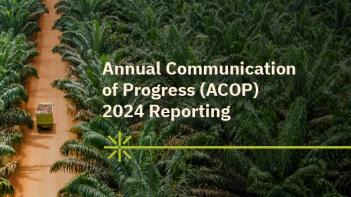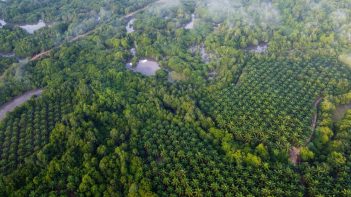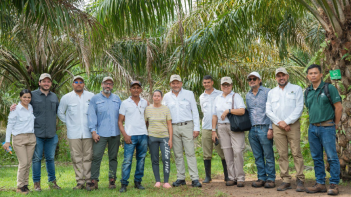The RSPO Board of Governors has officially endorsed the revised RSPO New Planting Procedure (NPP) 2021, ensuring consistency with the updated 2018 RSPO Principles and Criteria (P&C) as well as enhanced clarity of the NPP requirements and processes.
The RSPO NPP was initially developed in 2009 to provide a framework for the responsible development of new lands into oil palm in order to mitigate negative impacts on High Conservation Value (HCV) areas, High Carbon Stock (HCS) forests, peatland, fragile and marginal soils, as well as to uphold the rights of local peoples including their rights on the land being developed. A successful implementation of the NPP ensures that applicable and relevant indicators of the RSPO P&C are complied with when new development commences.
The revised NPP 2021 replaces the previous NPP that came into force for all new oil palm plantings from January 2010, providing improved guidance on development scenarios where NPP applies and how smallholders are to apply the planting procedure. Main key changes of the updated version include alignment of HCV/HCS assessments with the 2018 P&C; provisions on new developments planned by smallholders pursuing a P&C certificate with simplified toolkits applying a risk-based approach; and a case registry mechanism made available for RSPO members who wish to register their ongoing NPP case with the RSPO Secretariat.
Better reporting, better management planning
Wan Muqtadir, Head of Integrity of RSPO’s Integrity Unit, shared that the two year journey of developing the revised NPP has resulted in a more pragmatic and standardised way for members and Certification Bodies to report, thereby enabling a more efficient way to gain information.
Underscoring the effectiveness of the NPP, he said, “What the NPP has brought is a good mechanism for responsible planting by RSPO members. When the NPP is applied, growers are able to identify all the ‘go and no go areas’ for new oil palm development. When ‘no go areas’ are identified, you know you are preserving the environment and keeping the communities happy along the way.”
NPP management plans are integrated into the picture so auditors can check them during the P&C audits, ensuring continued responsibility of the new oil palm development areas. “Because of NPP, more HCV areas have actually been identified over the last five years, so we know that more HCV areas are being preserved,” added Muqtadir.
Lessons learned
The NPP revision process incorporated lessons learned from existing NPP implementation and the RSPO Theory of Change for RSPO members to implement commitments to halt deforestation, while ensuring the rights and livelihoods of local peoples are respected; and increasing smallholder inclusion.
“Learning from 11 years of implementing NPP, a tightened yet practical NPP 2021 process introduced advocating brownfield over greenfield lands for new development; and presented smallholders with simple and straightforward tools that consider diversity, capacity and incentives,” shared Javin Tan, RSPO Head of Standard Design and Innovation.
The revised NPP is the result of an extensive discussion and review that took place over two years, with two rounds of public consultation processes conducted in December 2020 and April 2021, and support from the NPP Revision Subgroup (NPPRS) consisting of RSPO members. A total of 630 comments were received from both public consultations.
The NPP 2021 is effective immediately with a six month grace period. All NPP submissions by 15 January 2022 onwards shall be completed in compliance with NPP 2021.
To provide RSPO members with a deeper look at the NPP 2021, a series of interactive webinars will be given to cover the NPP review process and overview, key changes in the updated document and NPP 2021 key dates. All RSPO members are encouraged to attend and register for the webinars here.
Keep reading

RSPO Forum for Members and Certification Bodies 2025: Strengthening Capacities and Building Bridges with RSPO Members

From Violence to Prosperity: Cultivating Sustainable Palm Oil in San Pablo, Colombia
Carry Over Credits for Certified Independent Smallholder Groups

From the Amazon to the Aisles: Discovering Sustainable Palm Oil in the Heart of Peru

Global Trends of Sustainable Palm Oil and China's Pathway

Final list of ACOP 2024 Non Submitters

New ISEAL Case Study Identifies Pathways to EUDR Compliance in Palm Oil Sector
Call for Expression of Interest: Nigeria National Interpretation Task Force for 2024 RSPO Principles and Criteria (RSPO P&C) and Independent Smallholder (ISH) Standard




